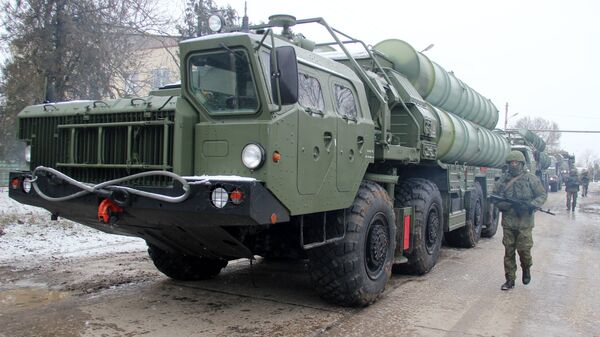"Bursting the Bubble", a new report by Swedish Defence Research Institute (FOI), claimed that Russia's ability to deter an enemy's deployment from a distance using long-distance missiles was exaggerated. The "bubble" refers to anti-access and area denial weapons (often referred to as A2/AD).
"In our report we establish that Russia's A2/AD capability is less effective than what is claimed by either the Russian military or the Western press. For one thing, it's more difficult than many people think to detect and strike a target that's dozens of kilometres away", FOI deputy research director Robert Dalsjö, the co-author of the report, said.
Secondly, analysis shows that the actual range of Russia's new anti-aircraft system, S-400, is actually only 150-200 kilometres, rather than the stated 400 kilometres. Against low-flying missiles, the S-400's range may be as short as 20 kilometres, the Swedish research claimed.
According to Dalsjö, this makes it impossible for Russia to "cut off" the Baltics using A2/AD resources alone. Instead, reinforcing the Baltics with NATO troops is "not hopeless as some debaters would claim", Dalsjö pointed out.
Dalsjö stressed that there are both passive and active countermeasures against A2/AD systems, ranging from electronic jamming to physical destruction.
"One can neutralise an entire system by knocking out just one link in a functional chain, for example a data link or a fire-control radar. And since seeing over the horizon requires airborne radar, it may then be enough to shoot down the radar aircraft", Robert Dalsjö stressed.
READ MORE: Russian Military Has 'the Muscles', Keeps Training 'the Brain' — Swedish Report
Among other things, the FOI researchers studied the conflict in Syria to support their claims.
"We can see that in spite of the fact that the Russians have sold one of their most modern anti-aircraft systems to Syria, the Syrians haven't managed to shoot down a single Western plane and, in thirty years, only a few isolated Israeli planes".
However, making Russia's A2/AD capability into a manageable problem requires commitments, the report concluded, promoting capacity-building and investments in areas such as electronic warfare, countermeasures, and guide weapons.
Another report by the Kista-based Defence Analysis Division, claimed that Russia's undeniable progress in electronic warfare largely rests on revived Soviet projects previously mothballed in the 1990s.
"It may seem strange that they're going back to such old ideas, but this is what's happening. These projects were intended to operate against the USA and NATO, which is why they fit with Russia's current threat picture", Jonas Kjellén, the author of the report, claimed.
Kjellén predicted that Russia will continue on the same path of jamming or even destroying electronics even when it runs out of projects to dust off. This, he claimed, was Russia's solution to retaining its ambitions despite being an outside shot in the superpower competition.
"Electronic warfare is the Russians' solution for dealing with deficiencies in traditional military means. In this way, with electronic warfare, they continue to strive to be a military superpower, but from the position of an underdog", Kjellén concluded.
READ MORE: 'More Than a Ballistic Missile': Nordic Analyst on Iskander's Alleged Threat
According to him, finding technical solutions for avoiding discovery and ensuring protection by means of signature reduction or different kinds of camouflage, is the cheapest solution for Russia, which, he claimed, cannot afford to keep up with the West's military technology.
In 2017, Samuel Bendett, a Centre for Naval Analyses expert, penned an opinion piece called "America Is Getting Outclassed by Russian Electronic Warfare", suggesting Russia's investment may have outpaced anything available in the West.
Following the 2018 Vostok drills in the Far East, President Vladimir Putin stressed that Russia was a "peace-loving country", refuting the idea that it could ever be aggressive and emphasising that its foreign policy is directed at creating cooperation with all countries that are interested in this.
By contrast, NATO has despite pledges of not expanding eastward, admitted most of the former Eastern bloc into its ranks.
READ MORE: Sweden Has Developed Jet Able to 'Kill' Russian Sukhoi Planes, Commander Claims




